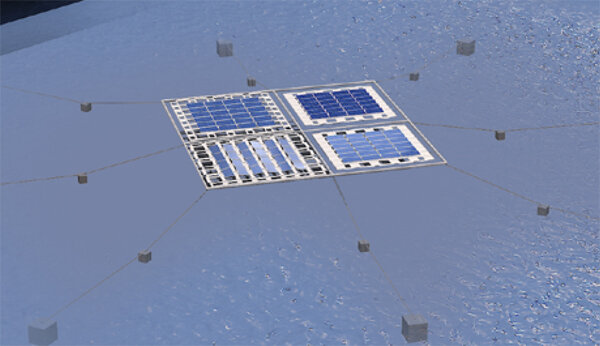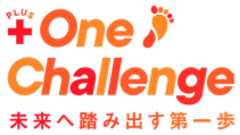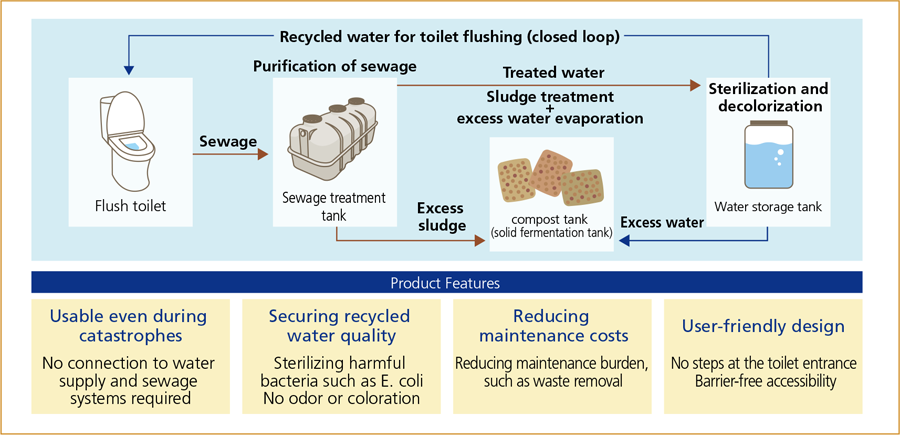
Business Overview
FY2022 Review and the Approach for the Current Period
In fiscal 2022, we worked on: 1) creating new and peripheral businesses, 2) expanding renewable energy businesses, 3) developing decarbonization-related technologies and services, and 4) implementing next-generation construction system.
In particular, we focused on the creation of new and peripheral businesses, including the manufacturing and sales of bio-toilets and the establishment of an internal idea solicitation system open to all employees. In the renewable energy sector, we generated approximately 300 million yen in revenue from the operation of five solar power plants. Furthermore, as our first off-site Power Purchase Agreement (PPA) project, we completed the Izumisano Nagataki No. 1 and No. 2 floating solar power plants in June 2023, commencing power generation. In this way, we have steadily achieved results, primarily in the creation of new and construction peripheral businesses and the renewable energy sector.
For fiscal 2023, in the renewable energy generation business, we will actively pursue PPA projects in rapidly growing agricultural reservoirs and conduct verification tests for floating solar power generation utilizing dam lakes and marine environments. We aim to expand the scope of our floating solar power generation and target a power generation capacity of 40 MW by fiscal 2024 and 150 MW by fiscal 2030, in line with the 2030 Carbon Neutral Roadmap. Additionally, beyond renewable energy generation, we are aiming to commercialize bio-toilet manufacturing and sales within fiscal 2023. We will continue to work on the development of new businesses contributing to a sustainable society.
Expansion Story of Floating Solar Power Generation

Floating solar power generation facilities involve minimal environmental modification, such as earthworks, i.e. landfilling and excavation, and forest clearing. They receive strong support from the government through subsidies, design and construction guidelines (New Energy and Industrial Technology Development Organization, NEDO), and installation guidance (Ministry of Agriculture, Forestry and Fisheries).
In contrast to large-scale solar power generation, the business environment is changing with the cessation of the previous Feed-in Tariff (FIT) system, and we are considering the commercialization of off-site and on-site PPA.
We have already commercialized off-site PPA in Izumisano City and are currently examining the commercialization of on-site PPA in private companies.
Many of the water surfaces targeted for floating solar power generation were previously agricultural reservoirs, offering favorable conditions for installation due to factors such as the absence of river inflow, shallow water depth, and smooth bottom surfaces. On the other hand, the surface area of domestic dams and lakes is more than ten times that of agricultural reservoirs according to our research. If these water surfaces can be utilized, it represents significant potential for the introduction of solar power generation.
In deep dams and oceans, it is necessary to consider factors such as significant water level fluctuations, waves, and tidal currents that are not present in reservoirs. To overcome these challenges, we have developed a new floating and mooring system. This technology has been selected for the Tokyo Bay eSG Project's pilot project, and we plan to conduct verification tests in the future.
In addition to continuing our efforts in agricultural reservoir-based floating solar power generation, we aim to expand our involvement in rapidly emerging on-site and off-site PPA projects. We also plan to explore suitable locations in deep dams and offshore areas to significantly expand our renewable energy generation business.
Risks and Opportunities


Topics
Establishment of an Internal System to Solicit New Business Ideas
In parallel with activities aimed at commercializing individual projects, we have established the internal ideas solicitation system (commonly known as the Plus One Challenge) to continuously and prolifically generate business ideas, commencing full-scale activities from the fiscal 2023.
Progress Toward Commercialization of Bio-Toilet Manufacturing and Sales
We are advancing the development of a bio-toilet that uses recycled water for toilet flushing. It can provide a hygienic and low-maintenance flush toilet with or without water supply or sewage infrastructure. In the future, we aim to launch its sales in fiscal 2023, after running tests of prototype units at our worksite.
Presentation of Bio-Toilet Treatment System

Starting Verification of Viability of Chicken Manure Biogas Generation Technology
With the aim of achieving a decarbonized society while creating new businesses, we have undertaken the project commissioned by the Ministry of the Environment to develop an energy recovery technology using chicken manure as raw material. We aim to put this into practical use by 2025 and will work on resolving issues at the verification plant.
Challenge for Zero-Carbon Bio-Industrial Creation
We have participated in a joint research project that focuses on CO2 fixation using photosynthetic bacteria as its core technology. Cultivation experiments have begun at the demonstration plant located on the Kyoto University Katsura Campus. Furthermore, this initiative has been selected for the Japan Science and Technology Agency (JST) Open Innovation Platform for Industry-Academia Co-Creation (COI-NEXT) program. We will continue to balance industrial creation, led by regional collaboration, with research and development.
